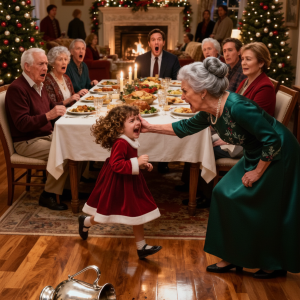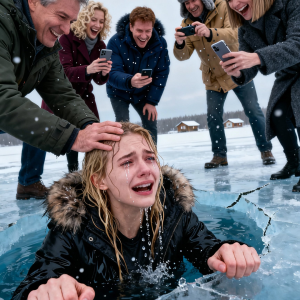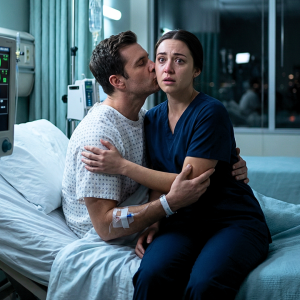
It had been six years since Celeste Moreau’s world had fallen apart.
Her only child, Gabriel, had vanished one sunny afternoon from their garden in Marseille. The police found no clues—no ransom note, no witnesses, nothing. For years Celeste searched the world, offering fortunes to anyone who could help, but every lead turned to dust. In time, she buried her grief beneath silk dresses, marble offices, and the image of an untouchable woman who had everything.
On a cold autumn evening in Paris, Celeste’s black limousine stopped in front of Maison Éclat, the restaurant where the city’s elite whispered and plotted over champagne. Dressed in a silver suit and diamond earrings, she stepped out, a living portrait of power and poise.
Rain had begun to fall, slicking the cobblestones and painting reflections of passing headlights. As Celeste walked toward the entrance, a small figure darted from an alley—a boy of perhaps ten, skinny, soaked, and clutching a crumpled paper bag of food scraps. Before anyone could react, he slipped and collided with her legs, sending dirty water across her immaculate clothes.
She froze, her breath sharp. “Watch where you’re going!”
The boy stumbled back, terrified. “I’m sorry, madam. I didn’t mean to—”
Her voice sliced through the murmuring crowd. “Do you have any idea what you’ve done? This suit costs more than everything you own!”
People stopped to stare. Some filmed. Others whispered. The glamorous business icon, famed for her poise, now stood yelling at a homeless child. Her temper snapped, and she pushed him away. He fell hard into a puddle.
Gasps erupted. Cameras flashed.
The boy looked up, trembling but silent. Then Celeste’s gaze caught on something—on his wrist was a tiny crescent-shaped scar, faint yet unmistakable. Her heart stuttered. Gabriel had one just like it.
The boy murmured, “I’m sorry, I just wanted to eat.” Then he turned and vanished into the blur of rain and light.
That night, Celeste could not close her eyes. Every time she tried, she saw his face—those gray-blue eyes that mirrored her son’s, that scar that she had once kissed. At dawn, she called her assistant.
“Lucien,” she said quietly, “find that child from last night. The one everyone’s talking about.”
Days later, Lucien returned with an envelope. “His name’s Noah,” he said. “No records, no family. Lives under the Pont de la Reine with an old man who calls himself Henri.”
That evening, Celeste disguised herself in a plain coat and walked along the river. The perfume of rot and rain filled the air. She found them beneath the bridge—an old man wrapped in a blanket and a boy curled beside him, asleep inside a cardboard box.
Around the child’s neck hung a small silver locket. The engraving was worn but still legible: “Gabriel.”
Her knees gave way. “Dear God…”
Henri stirred, eyes wary. “Looking for someone, lady?”
Celeste nodded, barely breathing.
“He’s a good kid,” Henri said softly. “Doesn’t talk much. Says his mama will find him one day. Keeps that pendant like it’s life itself.”
Tears blurred her vision. She left quietly, arranging a DNA test in secret with a strand of his hair she took while he slept. While waiting for results, she began sending food and blankets to their spot by the river—anonymously. The boy smiled more often now, though he never knew why his world had suddenly grown a little warmer.
Three days later, a single document arrived at her office.
DNA Match: 99.9%
Celeste sank to the floor, clutching the paper. She had screamed at her own son. She had pushed him. The boy she had prayed for every night was the same one she had humiliated in front of the world.
She arranged a place for him at a private shelter under her foundation’s name. When she went to tell him everything—to hold him, to beg forgiveness—he was gone.
“He ran away last night,” the caretaker told her. “He heard he was being moved and thought he’d be taken away again.”
Celeste drove through the city herself, through alleys and parks, calling his name through the rain. “Gabriel! Noah! Please, come back to me!”
Hours later, she found him under the same bridge. The old man, Henri, lay still beside him, gone in his sleep.
The boy clutched his pendant and whispered, “He said my mother would come. But she never did.”
Celeste fell to her knees, soaked and shaking. “She’s here,” she said. “I’m your mother, Gabriel. I never stopped looking for you.”
He stared, eyes wide and wet. “You? You pushed me.”
She nodded, tears spilling freely. “I didn’t know. I was blind. I’m so sorry. Please… let me make it right.”
After a long silence, he reached out and touched her face. “You came,” he said softly.
Celeste pulled him into her arms, holding him as the rain poured down. For the first time in six years, her heart began to heal.
Months later, the Moreau Foundation for Lost Children opened its doors—its mission: to bring missing kids home.
And every year, when the rain returned, Celeste and Gabriel went back to that same bridge—hand in hand, remembering the night a mother finally found her way back to her son.




